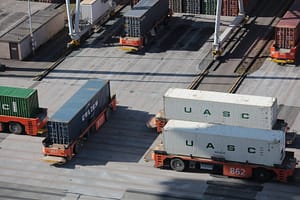According to the latest Office for National Statistics (ONS) Business Insights and Conditions Survey, the number of transport & storage sector companies reporting that homeworking will remain part of their permanent business model has fallen to 2.8%.
The home delivery expert Parcelhero says fewer transport & storage companies (the category which includes logistics, parcels, haulage and warehousing employers) now report they use homeworking compared to any other sector, even including accommodation & food services.
Parcelhero’s Head of Consumer Research, David Jinks M.I.L.T., says: ‘This result shows a marked decline in enthusiasm for flexible working from when the question was last asked in the survey, which was back in the spring. Between 19 May and 1 June, 8.2% of companies responding to the survey reported they were using or intending to use increased homeworking as a permanent business model going forward. This latest survey, held between 18 to 31 August, revealed just 2.8% said homeworking was part of their permanent business model.
‘In contrast, the latest survey responses from transport & storage companies’ manufacturing and retail partners reveal greater enthusiasm for homeworking. 7.7% of manufacturers and 14.1% of retailers said they use or intend to use increased homeworking as a permanent business model. Indeed, in a number of other business sectors, the difference in attitudes to working from home is even more marked. 37% of science & technical sector businesses and a whopping 47% of information & communication sector organisations said homeworking is part of their permanent business model.
‘Could this reluctance on the part of transport & storage sector firms to continue with hybrid working practices be impacting their results? The latest Business Insights Survey also reveals a worrying 14.5% of transport & storage firms reporting they have been unable to meet demands because of a shortage of workers. That’s the highest number of businesses reporting this problem of any business sector.
‘This begs the question: is a lack of flexibility over homeworking responsible for this shortage of workers? In the previous Business Insights Survey, held between 4 and 17 August, 23.9% of transport & storage companies with 10 or more employees said their business was experiencing a shortage of workers, which was more than any other sector except education (24.9%).
‘However, while transport & storage sector companies clearly need to examine whether their less flexible working practices are outdated or just plain unattractive, there are good reasons why the sector cannot embrace homeworking as wholeheartedly as the IT and comms sectors. 63% of transport & storage companies said that homeworking is not suitable for their business.
‘In many ways, this makes sense. Drivers and warehouse operatives need to be physically in their driving seats or distribution centres and cannot work from home. However, this does seem to have created an anti-homeworking mindset within the sector, which isn’t seen in many others.
‘It is interesting to see the other reasons transport & storage sector companies gave for not embracing homeworking as a permanent part of their business model. 13.1% cited difficulties managing staff remotely; 11.7% mentioned concerns with integrating new starters into the workplace; 7.6% mentioned reduced communication; 7.5% a negative impact on working culture; 6.8% reduced productivity; 5.5% reduced reliability and retention of staff; 1.4% security concerns and 1% the cost of employee equipment.
‘At the beginning of this year, we warned that if more transport & storage sector companies continued to abandon hybrid working, there could be a sector-wide skills shortage. Looking particularly at administration roles, this means that experienced managers, customer service and IT staff will turn to other industries that offer more flexible practices.
‘Working from home is just one of the transformations that technology is enabling across the logistics and wider retail sector.






Leave a Comment